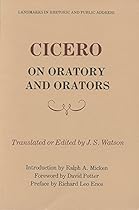Cicero on Oratory and Orators (Landmarks in Rhetoric & Public Address)

| Author | : | |
| Rating | : | 4.75 (944 Votes) |
| Asin | : | 080931293X |
| Format Type | : | paperback |
| Number of Pages | : | 440 Pages |
| Publish Date | : | 2017-10-05 |
| Language | : | English |
DESCRIPTION:
Quite a mouthful!!!! This is considered by many to be Cicero's magnum-opus of his career. Whether it is or not is a topic of debate. What is outside the jurisdiction of debate is that it is a landmark work in the history of oratory.In it Cicero details the various oratorical techniques which should be employed by the master of elocution.. learning from the wisdom of the ancient thinkers Pamela D. Schulz Cicero provides us all with an opportunity to discover what matters when stepping up to the podium in academic or public debate. Throughout this carefully translated book lies the wisdom of the ancients which all of us in public and private life ought to consider "the means by which the minds of men excited or calmed. Latin or English? William S Jamison What a load of waffle. The most interesting aspect of this is how it demonstrates that the famous Romans were in no better shape understanding themselves or what makes oration good than anyone. Know your audience, and know what you are talking about. Speak eloquently but not so much so that you are overly fine, nor b
Micken is Emeritus Professor of Speech and former Chairman of the Department at Southern Illinois University, Carbondale.. Ralph A
Language Notes Text: English, Latin (translation)
Contains Cicero’s De Oratore and Brutus, influential sources over the centuries for ideas on rhetoric and training for public leadership. The De Oratore, written in 55 B.C., argues that rhetoric is socially significant because states are established and maintained through the leadership of eloquent men. The three books of dialogues in this volume feature discussions between well-known figures in Roman history, including Lucius Crassus, Marcus Antonius, Quintus Lutatius Catulus, Quintus Marcius Scaevola, Caius Aurelius Cotta, Julius Caesar Strabo Vopicus, and Publius Sulpicus Rufus. The Brutus continues the theme of the dialogues, giving a history of eminent orators whose performances exemplify the Ciceronian theory that rhetoric finally adds up to leadership.
